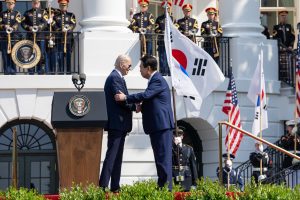Kim Yo Jong, the powerful sister of North Korean leader Kim Jong Un and Pyongyang’s main voice on inter-Korean relations, denounced the “Washington Declaration” and “Nuclear Consultative Group,” two main initiatives that were introduced during the South Korea-U.S. summit meeting on April 26.
“The ‘Washington Declaration’ fabricated by the U.S. and South Korean authorities is a typical product of their extreme anti-DPRK hostile policy reflecting the most hostile and aggressive will of action,” Kim said in her statement published in Korean Central News Agency (KCNA), one of the main North Korean state-controlled media, on April 29. (DPRK is the abbreviation of North Korea’s formal name: the Democratic People’s Republic of Korea.) Calling the Declaration a demonstration that the United States and South Korea harbor hostile intent toward North Korea, she also claimed that it will result in “making peace and security of Northeast Asia and the world be exposed to more serious danger.”
The Washington Declaration is the joint announcement made by South Korean President Yoon Suk-yeol and U.S. President Joe Biden following their summit meeting last week. Marking the 70th anniversary of the South Korea-U.S. alliance, the United States reconfirmed its solid defense commitment to South Korea and vowed to enhance extended deterrence against the security threats posed by North Korea. That will include more frequent deployment of U.S. strategic (i.e. nuclear-capable) assets to South Korea.
In exchange, Yoon clearly ruled out his country seeking nuclear weapons by showing his full confidence in U.S. extended deterrence and reaffirming South Korea’s commitment to follow the Nonproliferation Treaty. The two leaders described the alliance as ironclad and the strongest ever.
Kim Yo Jong criticized the outcomes and remarks made in the South Korea-U.S. summit meeting one by one.
“The formation of ‘Nuclear Consultative Group,’ the regular and continuous deployment of U.S. nuclear strategic assets, and the frequent military exercises made the regional politico-military situation unable to extricate itself from the currents of instability,” Kim said. “This provides us with an environment in which we are compelled to take more decisive action in order to deal with the new security environment.”
In order to soothe South Koreans’ strong desire for the development of nuclear weapons to deter the North’s nuclear attack, the United States said it “will further enhance the regular visibility of strategic assets to the Korean Peninsula” and “will expand and deepen coordination” with the South Korean military. In practice, that means U.S. strategic assets will regularly be mobilized in the reinvigorated South Korea-U.S. joint military drills. According to the statement published by the White House, a U.S. nuclear ballistic missile submarine is scheduled to head to South Korea as the evidence of its enhanced commitment.
The South Korean Presidential Office and the ruling People Power Party called this de facto nuclear sharing and nuclear deployment. However, the U.S. authorities clearly underscored that the new measures does not indicate the redeployment of U.S. nuclear assets to the South, showing the different endgames of nuclear policy between Washington and Seoul.
Amid the overwhelming support of South Koreans for indigenous nuclear weapon development, the United States has repeatedly emphasized its firm defense commitment in a bid to express its opposition to South Korean nuclear arms, which could cause a nuclear domino effect in the region. Regardless of their firm support for the U.S. commitment to South Korea, South Koreans continue to believe that nuclear weapons are the ultimate tool to deter a nuclear attack from the North.
Biden said a nuclear attack by North Korea against the United States and its allies will “result in the end of whatever regime.” Washington already warned Pyongyang that the Kim regime will never be able to survive should it make a preemptive nuclear attack. Such remarks seem to be part of Washington’s effort to mollify South Koreans’ fears of a nuclear attack. From Pyongyang’s perspective, however, such rhetoric is a clear reason for bolstering their efforts to develop stronger nuclear weapons.
“It may be taken as a nonsensical remark from the person in his dotage who is not at all capable of taking responsibility for security and the future of the U.S., an old man with no future,” Kim said.
Kim also warned about Pyongyang’s “after-storm” response toward Biden’s threatening rhetoric while calling it an opportunity to remind them what to do in the future.
“We are convinced once again of the fact that the enhancement of the nuclear war deterrent, especially the second mission of the nuclear war deterrent, should be brought to further perfection,” Kim said. “The more the enemies are dead set on staging nuclear war exercises, and the more nuclear assets they deploy in the vicinity of the Korean Peninsula, the stronger the exercise of our right to self-defense will become in direct proportion to them.”
A day after it published Kim’s statement, KCNA released a commentary deriding Yoon for his “power for power” approach to North Korea, which mirrors Pyongyang’s own old-school approach to the U.S. and South Korea. Unlike his predecessor, Moon Jae-in, Yoon prioritizes scaling up the military drills with the U.S. and strengthening the South Korea-U.S. alliance over reactivating inter-Korean dialogue. Due to his relatively hawkish stance on North Korea, Pyongyang ruled out future negotiations with the Yoon administration just three months after he took office in May 2022.
Yoon and Biden briefly added that room for dialogue with North Korea is still open without any preconditions. However, it is questionable how they plan to reactivate diplomacy and dialogue with North Korea amid the intensified arms race on the Korean Peninsula.

































